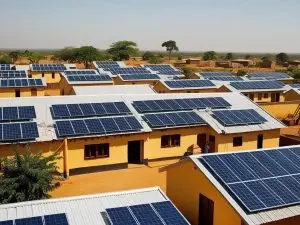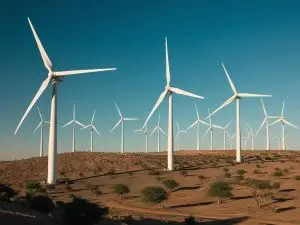Nigeria, Africa’s most populous country, faces a major challenge in providing reliable electricity to its citizens. Despite having abundant energy resources, millions of Nigerians still live without access to electricity. One of the most promising solutions to this problem is renewable energy and off-grid electrification. These technologies can help provide clean, affordable, and sustainable power to communities, especially in rural areas.
The Energy Situation in Nigeria

Many people rely on petrol and diesel generators, which are expensive, noisy, and harmful to the environment. To address this issue, renewable energy sources such as solar, wind, and hydropower are becoming more popular as alternative solutions.
Renewable Energy Sources in Nigeria
Nigeria is blessed with vast renewable energy resources. The major sources include:
1. Solar Energy
Nigeria has abundant sunshine, receiving an average of 5-7 hours of sunlight per day. This makes solar energy one of the most viable solutions for off-grid electrification. Many homes and businesses now use solar panels and solar home systems to generate electricity.
Suggested Image: A Nigerian village with solar panels on rooftops.
2. Wind Energy
Wind energy is another potential source of clean power. Some northern states like Katsina, Sokoto, and Kano have strong wind currents that can be used to generate electricity. However, wind energy is still in its early stages of development in Nigeria.
Suggested Image: A wind farm in northern Nigeria with wind turbines generating electricity.
3. Hydropower
Nigeria has many rivers that can generate hydroelectric power. Large dams such as Kainji, Jebba, and Shiroro contribute to electricity generation, but small-scale hydroelectric projects can also power rural communities.
Suggested Image: A small hydroelectric dam providing electricity to a local village.
4. Biomass Energy
Agricultural and organic waste can be converted into biogas and biofuels to generate electricity. Biomass energy can reduce dependence on fossil fuels and provide electricity to off-grid communities.
Suggested Image: A rural community using a biogas system to generate electricity.
What is Off-Grid Electrification?
Off-grid electrification refers to power solutions that do not depend on the national electricity grid. It includes:
1. Mini-Grids
Mini-grids are small, independent power networks that provide electricity to a village or community. They use renewable energy sources like solar, wind, or small hydro systems. Mini-grids can supply power to homes, businesses, schools, and health centres.
Suggested Image: A mini-grid solar farm with transmission lines connecting homes in a rural community.
2. Solar Home Systems (SHS)
A solar home system is a stand-alone solar power unit designed for individual households. It includes solar panels, a battery for storage, and LED lights. Some systems also power fans, radios, TVs, and phone chargers.
Suggested Image: A Nigerian family using a solar home system at night.
3. Pay-As-You-Go (PAYG) Solar
Pay-as-you-go (PAYG) solar allows families to pay in small installments for solar power instead of buying expensive generators. This system is helping low-income families afford clean energy.
Suggested Image: A Nigerian market woman making a mobile payment for PAYG solar energy.
Benefits of Renewable Energy and Off-Grid Electrification
- Reliable Power Supply: Solar, wind, and hydro systems reduce dependence on the unstable national grid.
- Cost-Effective: Over time, solar and mini-grids are cheaper than petrol or diesel generators.
- Environmentally Friendly: Renewable energy reduces air pollution and greenhouse gas emissions.
- Job Creation: The renewable energy sector provides employment opportunities for technicians, engineers, and entrepreneurs.
- Improved Healthcare and Education: Reliable electricity powers hospitals, schools, and businesses, improving the quality of life.
Challenges Facing Renewable Energy in Nigeria
- High Initial Cost: Setting up renewable energy systems requires significant investment.
- Lack of Awareness: Many Nigerians still do not fully understand the benefits of solar and other renewable energy sources.
- Government Policies and Regulations More support is needed from the government to promote renewable energy and provide incentives.
- Maintenance and Technical Support: Skilled professionals are needed to maintain and repair renewable energy systems.
The Future of Renewable Energy in Nigeria
The Nigerian government and private investors are increasing efforts to expand renewable energy. Initiatives such as the Rural Electrification Agency (REA) and international partnerships are supporting mini-grid projects and solar energy programs. With more investment and awareness, millions of Nigerians can gain access to clean and affordable electricity.
Conclusion
Renewable energy and off-grid electrification are the future of Nigeria’s power sector. By embracing solar, wind, hydro, and biomass energy, Nigeria can improve electricity access, reduce environmental pollution, and create economic opportunities. With the right policies and investments, every Nigerian, including those in remote villages, can enjoy reliable and sustainable electricity.
